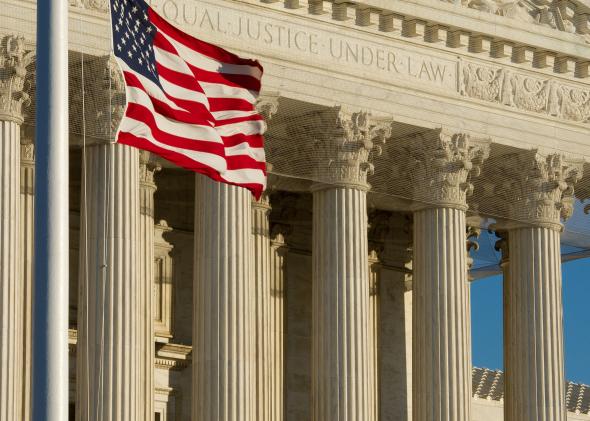Proof the Supreme Court Doesn’t Understand Racism at All

Photo by Paul J. Richards/AFP/Getty Images
If you haven’t, you should read my colleague Emily Bazelon on the Supreme Court’s decision to uphold Michigan’s ban on affirmative action if you want to understand the ruling and its implications. For this post, however, I want to look at a single passage from Justice Anthony Kennedy’s majority opinion that illustrates a flawed thinking on racism that has huge currency on the Right.
After rejecting the appeals court’s argument that Michigan’s affirmative action ban violated the equal protection clause of the Fourteenth Amendment, Kennedy questioned the foundation of affirmative action policies writ large, wondering if—by sticking to race consciousness—we’re overmedicating the patient:
In a society in which those lines are becoming more blurred, the attempt to define race based categories also raises serious questions of its own. Government action that classifies individuals on the basis of race is inherently suspect and carries the danger of perpetuating the very racial divisions the polity seeks to transcend.
Each sentence packs a huge claim, and each one is off-the-mark. While Americans like to imagine a future of mixed-race mutts—see this National Geographic cover—the reality will be more complicated. For as much as there are increasing rates of intermarriage between all groups, it’s also true that segregation remains the rule for low-income African Americans, Latinos, and many low-income whites. Huge numbers of minorities live in hyper-segregated neighborhoods of concentrated poverty, isolated from the mainstream of American life. In this world—where integration is stagnant—it’s a stretch to say that the “lines” are blurring.
More egregious is the idea that racial classification—and race consciousness—is the true danger to racial harmony. In fairness to Kennedy, it stems from the common view that “skin color” is the locus for racism and discrimination. Hence, colorblindness: If we ignore skin color—if we disregard race—then we’ll deal with the problem of racial division.
But “race” isn’t responsible for Jim Crow, any more than brown skin is the reason for an unfair police stop, or a “black name” the cause of an unfair evaluation. Those actions—the institutions that support them, and the ideas that justify them—are a product of racism, the system of violence and disenfranchisement that marks the whole of the American experiment.
Likewise, it’s racism that causes our racial divisions, not race. Race, by contrast, is what delineates the divisions established by racism. Or, as the late Edmund Morgan describes in American Slavery, American Freedom, Africans weren’t enslaved because they were black, they became “black”—as a distinct class—after they were enslaved.
To confuse “race” with “racism” is to fall into confusion, where any action that references race is verboten, and there is no distinction between discrimination to further racism, and discrimination to ameliorate it. This is the core of Kenndy’s mistake. To him—and the conservative majority on the Court—affirmative action is suspect because, like Jim Crow, it “classifies on the basis of race.”
But the evil of American apartheid was its oppression, not its classification. And we deal with that evil by trying to level the playing field for its targets and their descendants. To draw a moral equivalence—or to suggest, as Chief Justice John Roberts does, that anti-racism causes prejudice—is to fall into ahistorical gobbledygook. Which, it turns out, is what happened.
